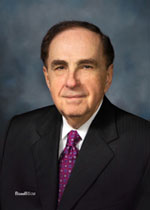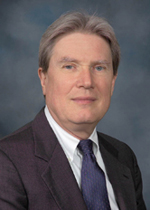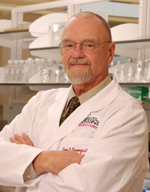 |
Harold M. Maurer, M.D. |
 |
Bob Bartee |
 |
Tom Rosenquist, Ph.D. |
One of the major accomplishments of the 2008 session of the Nebraska Legislature was the passage of LB 606, a compromise bill pertaining to the human embryonic stem cell research being done at UNMC as well as the use of somatic cell nuclear transfer (SCNT).
Beginning with the 2000 legislative session, UNMC has faced some sort of opposition to its cutting-edge research programs for the past nine years in the Legislature. In recent years, opposition in the Legislature has focused on UNMC’s use of human embryonic stem cells as well as the SCNT process, also known as therapeutic cloning.
“LB 606 will allow us to move forward in conducting 21st century research,” said UNMC Chancellor Harold M. Maurer, M.D. “That is critical as we strive to become a world-class academic health science center.”
UNMC vice chancellor for external affairs Bob Bartee expressed his appreciation for the hard work of Sens. Brad Ashford and Steve Lathrop for getting the bill through.
“I also want to applaud the members of the this year’s Judiciary Committee who supported this vital research — Sens. Ernie Chambers, DiAnna Schimek, Vickie McDonald and Amanda McGill,” he said.
Chambers, Schimek and McDonald are leaving the Legislature this year due to the term limit law enacted in 2000 that restricts senators to serving two consecutive terms (or eight years). Bartee also expressed his special appreciation for other term-limited state senators for their ongoing leadership and support of UNMC’s research programs over the years. Senators in this category singled out by Bartee were:
- Sen. Joel Johnson of Kearney,
- Sen. Lowen Kruse of Omaha,
- Sen. Ray Janssen of Nickerson, and
- Sen. Ron Raikes of Lincoln.
LB 606 will allow UNMC researchers to continue to do research on human embryonic stem cells using federally approved cell lines in university facilities. However, under the provisions of LB 606, no state funds and facilities can be used to destroy an embryo for the purpose of research or to create an embryo through SCNT.
“Research involving the federally permissible human embryonic stem cell lines is not restricted by the new law,” said Tom Rosenquist, Ph.D., vice chancellor for research. “That is very positive as we go forward with the development of a UNMC center for regenerative medicine, and as we continue to recruit world-class scientists in several areas of research.”
In relation to research involving human embryonic stem cell lines, LB 606 would:
- Allow UNMC to do research with public and private funding on human embryonic stem cell lines as long as the cell lines were developed elsewhere; and
- Allow UNMC to do research with public and private funding on SCNT lines as long as the lines were developed elsewhere.
The bill would not:
- Alter the Board of Regents’ policy that allows UNMC scientists to use only federally approved stem-cell lines;
- Affect the Board of Regents’ policy that prohibits University of Nebraska scientists from conducting research using stem cell lines produced through SCNT;
- Restrict human embryonic stem cell line creation or research done using private money and private facilities; and
- Restrict SCNT cell line creation or research done using private money and private facilities.
LB 606 encourages scientists to pursue research projects using non-embryonic stem cells rather than embryonic stem cells. Up to $500,000 in state tobacco settlement funds will be set aside in matching funds each year for non-embryonic stem cell research projects with no single institution in the state eligible to receive more than 70 percent of the funds.
|
|
“With many of our researchers already conducting research involving adult stem cells, this is a very positive element of the compromise bill,” Bartee said. “Competition for peer-reviewed research funding is fierce, and this support will better arm our researchers to be successful in this environment.”
Bartee noted that there is a strong likelihood that the research landscape will change dramatically after this year’s presidential election.
“All three of the leading presidential candidates have expressed an interest in expanding the number of federally approved human embryonic stem cell lines,” he said. “With that being the case, this should result in increased federal funding for this research and more opportunities for scientists to pursue this exciting research.”